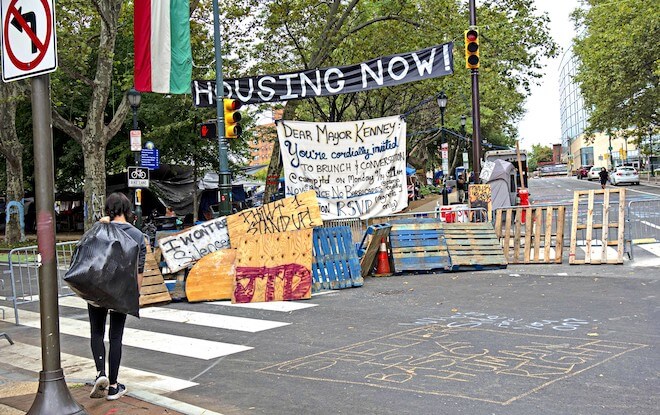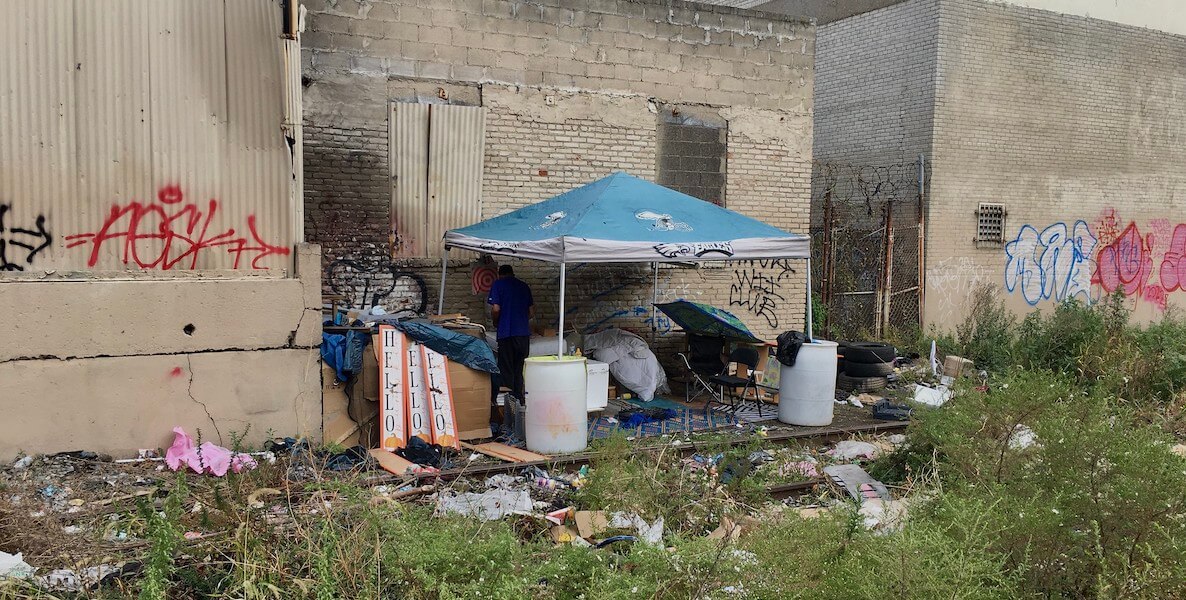This week, the U.S. Supreme Court hears oral arguments in City of Grants Pass, Oregon, v. Gloria Johnson, a case that the National Low Income Housing Coalition calls “the most significant court case about the rights of people experiencing homelessness in decades.”
Johnson was homeless in Grants Pass, where there are no shelters and where camping in public or sleeping in a van is illegal. After being punished for camping outdoors, Johnson and a group of homeless people went to court, claiming the city’s municipal code violates the Eighth Amendment’s Cruel and Unusual Punishment Clause and Excessive Fines Clause, since Johnson essentially had nowhere else to sleep but in public. Six years after the original legal complaint, the Supreme Court will hear the case.
This case will have broad implications for how cities handle people experiencing homelessness. As of the last official HUD count (which many people consider an undercount), more than 650,000 people were homeless in the U.S., up 12 percent since just last year. Of that number, more than 4,700 lived in Philadelphia, up for a second year in a row. No one should be surprised that homelessness is rising given that the home price-to-income ratio has reached a record high.

A modern day debtors prison
Housing advocates have rightly pointed out that many cities have failed to produce the housing and services needed to keep people off the streets. In addition to the high cost of land, labor and materials, governments have constrained housing production with their exclusive zoning codes and cumbersome permitting processes. At the federal level, too little money is invested in public housing or vouchers that many desperately need to stay housed.
And in many places, it’s impossible to find housing on the lowest rung of the housing ladder, such as single-room occupancy buildings or mobile homes. How can you blame — and punish — people for being homeless under these circumstances? Though Congress abolished debtors’ prisons in 1833, jailing homeless people is essentially a different form of that practice of jailing people for being too poor.

A drawing of a debtors’ prison from Charles Dickens’s Pickwick Papers
But jail homeless people we do. In Miami, where the home price-to-income ratio is now 10 to 1, the city has arrested homeless people for camping on the beach since the end of 2023. If the Supreme Court sides with Grants Pass, you can bet more cities will take this severely misguided approach. Jail time only makes exiting homelessness harder for people. As the Vera Institute puts it:
Homeless people who are arrested for sleeping on the street will not likely be released on the promise to return to court, because they do not have an address. They may also be unable to pay even low bail amounts, leading to time behind bars while awaiting a trial. (Twenty-six percent of people in jail reported being homeless within a year before incarceration, according to the Corporation for Supportive Housing.)
After release, a criminal record may make it even harder for homeless people and their families to acquire or retain public benefits, housing, or employment, given the common practice by government agencies, potential landlords, public housing authorities, and potential employers of screening for and excluding those with criminal histories.
An unacceptable option
And yet, it’s important to recognize that Johnson’s offense — camping in public — is also very problematic. According to HUD, encampments are increasing at levels not seen in almost a century, and while the majority of homeless people live in major metros, encampments tend to exist in less heavily populated cities.

Philadelphia is no stranger to encampments: A 150-person encampment sprang up on the Parkway in 2020. The temporary site was an unsatisfactory solution for everyone involved — especially as now the city isn’t even building the tiny house village that the homeless advocates fought for. I believe it would be wrong to view a ruling in favor of Johnson as a vindication for encampments.
Since the original Grants Pass case, Oregon has made it illegal for cities to punish camping in public. This is not the right answer, as it enables encampments and hinders local governments’ ability to get homeless people into better, more supportive housing options. Oregon now leads the nation in unsheltered families and unsheltered youth. Portland saw its homelessness rate spike 20 percent in 2023, outpacing the rest of the country.
The problem in Grants Pass is the city sought to both prohibit camping and also wasn’t willing to house the homeless — an awful combination. Hopefully this case will spark a conversation about how our cities, our states and our federal government need to take greater responsibility for the housing crisis in this country — not try to sweep it away with punishments or jail time, but by building more housing.
In Philadelphia, we have an opportunity to partner with our large healthcare sector to provide housing for the homeless. Many people experiencing homelessness are dealing with mental and physical health issues and are frequent — and expensive — users of hospital emergency rooms. Healthcare systems in Denver and even in neighboring New Jersey have found it’s less expensive to build new housing for people experiencing homelessness than to treat them through frequent ER visits. Could hospitals write a prescription for housing to heal our homelessness problem? Definitely.
We also could do more to build more affordable housing. The truth is that building more affordable housing might actually mean a coalition of nonprofits and local government buying existing housing and maintaining it as affordable. This might be a faster and less expensive way to amass the units we need than building new, multi-unit buildings from scratch.
These housing solutions are the ones we should be pressing, even if the court rules in favor of Johnson. It’s important to distinguish that ruling from an endorsement of encampments, or letting people remain homeless on the streets in any fashion. That’s not an acceptable solution either.
![]()
MORE FROM THE NEW URBAN ORDER SERIES
Photo by Ted Cavanaugh for Flickr.


